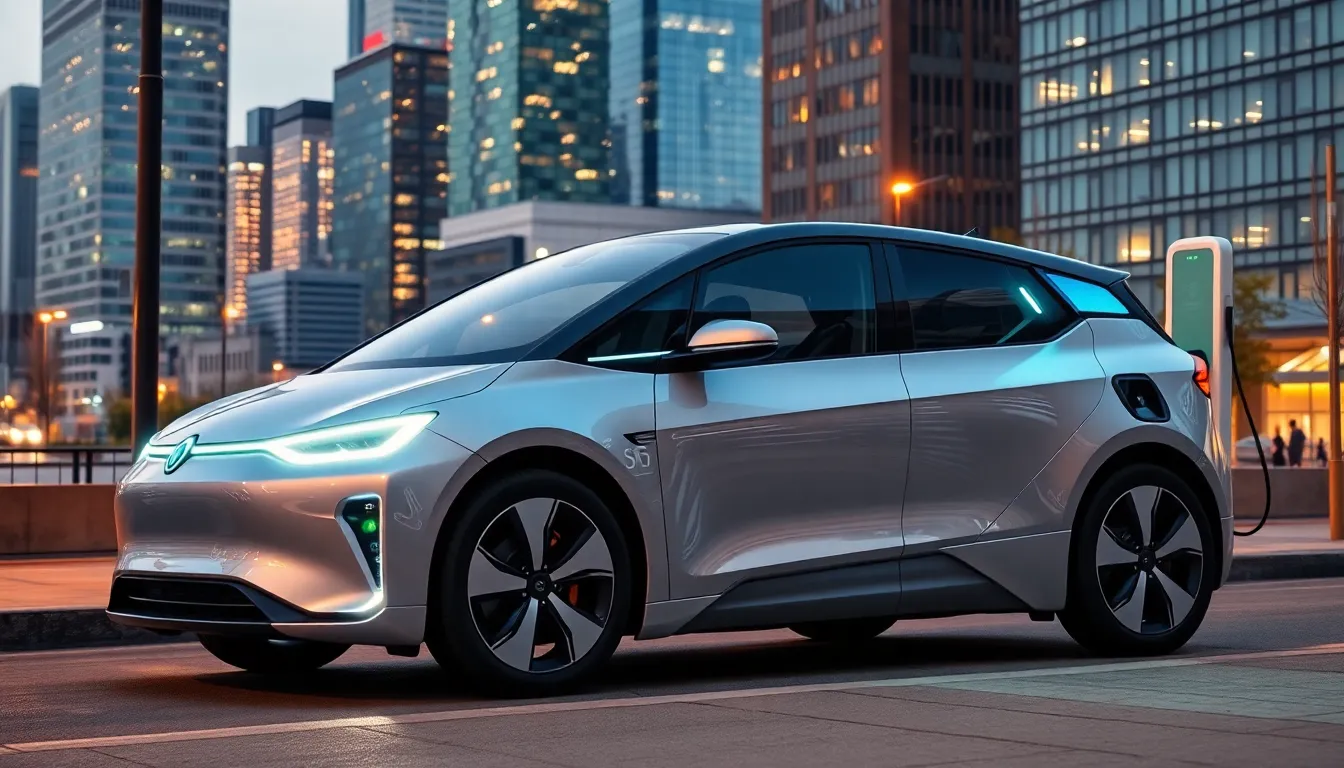Automotive technology is transforming the way people interact with their vehicles, making them smarter and more efficient than ever before. From electric vehicles to advanced driver-assistance systems, innovations are reshaping the automotive landscape and enhancing the driving experience. As technology continues to evolve, it’s crucial to understand how these advancements impact safety, sustainability, and convenience.
In a world where connectivity reigns supreme, the integration of artificial intelligence, IoT, and big data into vehicles is not just a trend but a necessity. These technologies are driving the future of transportation, paving the way for a new era of mobility. Exploring the latest developments in automotive technology reveals not only the potential for improved performance but also the promise of a greener future for the automotive industry.
Table of Contents
ToggleOverview Of Automotive Technology
Automotive technology encompasses various innovations that enhance vehicle performance, safety, sustainability, and user experience. Key advancements include electric vehicles (EVs), which reduce reliance on fossil fuels and lower emissions. In 2023, EV sales reached over 6.3 million units globally, representing a 60% increase from the previous year.
Advanced Driver-Assistance Systems (ADAS) play a crucial role in improving road safety. These systems utilize sensors, cameras, and algorithms to assist drivers. Features such as adaptive cruise control, lane-keeping assistance, and automatic emergency braking significantly reduce accident rates. According to the National Highway Traffic Safety Administration, vehicles equipped with ADAS can decrease crashes by up to 40%.
Artificial Intelligence (AI) and the Internet of Things (IoT) are pivotal in shaping future automotive trends. AI algorithms process vast amounts of driving data, enabling predictive maintenance and personalized user experiences. Meanwhile, IoT connectivity allows vehicles to communicate with each other and infrastructure, improving traffic management and reducing congestion.
Big data analytics also contribute to advancements in automotive technology. By analyzing consumer behavior and driving patterns, manufacturers can enhance product development and optimize supply chains. In 2022, the global automotive big data market was valued at $25 billion, and it is expected to grow at a compound annual growth rate (CAGR) of 19% through 2030.
These technological advancements not only push the boundaries of vehicle design but also drive the shift toward a more sustainable and efficient automotive industry. The integration of these technologies represents a significant transformation in how people interact with their vehicles and the overall transportation ecosystem.
Key Innovations In Automotive Technology

Automotive technology continually evolves, introducing innovations that reshape the vehicle landscape. Key areas include electric vehicles, autonomous driving, and advanced safety features.
Electric Vehicles
Electric vehicles (EVs) represent a significant shift in automotive technology. Global EV sales surpassed 6.3 million units in 2023, reflecting a 60% increase from 2022. This growth emphasizes a transition towards environmentally friendly alternatives to traditional fossil fuel vehicles. Major automobile manufacturers are investing heavily in EV development, with over 300 models available globally. Key players include Tesla, Ford, and Volkswagen, focusing on enhancing battery efficiency and reducing charging times. Battery technology advances, such as solid-state batteries, promise longer ranges and improved performance.
Autonomous Driving
Autonomous driving technology progresses rapidly, aiming to increase safety and convenience. Level 2 and Level 3 automation systems are becoming standard, allowing vehicles to handle specific driving tasks. Companies like Waymo, Tesla, and Cruise are at the forefront, utilizing artificial intelligence and sensor technology to enable features such as lane-keeping assistance and traffic-aware cruise control. Regulatory bodies are increasingly establishing guidelines to ensure the safe deployment of fully autonomous vehicles. As of 2023, over 200,000 vehicles with some level of automation operate on public roads, setting the stage for future advancements.
Advanced Safety Features
Advanced safety features enhance vehicle security and reduce accidents. Technologies such as adaptive cruise control, lane departure warning, and automatic emergency braking are becoming commonplace. Studies indicate that these features can potentially reduce crashes by up to 40%. Car manufacturers are integrating artificial intelligence to improve these systems, enabling vehicles to learn from driving patterns and traffic conditions. In 2022, the advanced driver-assistance systems (ADAS) market was valued at $30 billion, signaling a significant investment in safety. Enhanced safety measures not only protect vehicle occupants but also promote confidence in the overall driving experience.
Impact On The Automotive Industry
Automotive technology significantly influences the industry, driving economic growth and reshaping environmental strategies. These advancements usher in new paradigms for vehicle design, production, and consumer interaction.
Economic Implications
Economic impacts manifest through various channels. EV production spurred over $100 billion in investments globally in 2022, indicating substantial industry shifts. New jobs arise from the EV sector, with projections estimating the creation of approximately 2 million positions by 2030. Major manufacturers, including Ford and General Motors, allocate billions for electric vehicle platforms and infrastructure, enhancing competitiveness. Startups specializing in autonomous and connected vehicle technology attract significant venture capital, with funding levels reaching $10 billion in the past year. This infusion of capital leads to an expanding supply chain and innovative solutions, ultimately fostering a more robust economy.
Environmental Considerations
Environmental impacts are profound and multifaceted. The shift to electric vehicles correlates with a anticipated reduction of 1.5 billion tons of CO2 emissions annually by 2030. Battery advancements, such as solid-state technology, promise improved recyclability and sustainability, further mitigating environmental footprints. Automakers emphasize eco-friendly manufacturing processes, with many achieving carbon neutrality by 2040. Increased digitization streamlines logistics and reduces waste, aligning with global sustainability goals. Such strides support the shift toward a greener automotive industry, benefitting both the planet and future generations.
Future Trends In Automotive Technology
Automotive technology is evolving rapidly, with significant advancements shaping the future of the industry. Connected vehicles and smart manufacturing stand out as transformative trends that enhance vehicle performance and optimize production processes.
Connected Vehicles
Connected vehicles leverage the Internet of Things (IoT) to enhance communication between cars, infrastructure, and other road users. Several benefits arise from this interconnectivity, including improved traffic management, reduced congestion, and enhanced safety measures.
- Vehicle-to-Everything (V2X): V2X technology allows vehicles to communicate with each other and surrounding infrastructure. This integration improves situational awareness and can lead to data-driven decision-making to prevent accidents.
- Real-time Data Analysis: Connected vehicles utilize data analytics to monitor vehicle health and driving patterns. Predictive maintenance reduces downtime by identifying issues before they escalate.
- Enhanced User Experience: Features like remote diagnostics and over-the-air updates enhance vehicle functionality. Users can customize their experience with apps that provide infotainment services and navigation assistance.
As of 2023, over 40% of new vehicles sold include some level of connectivity, indicating that manufacturers recognize the importance of this technology in future development.
Smart Manufacturing
Smart manufacturing processes leverage advanced technologies like AI, robotics, and big data to streamline production and improve efficiency. The automotive industry sees several trends driving this evolution.
- Automation and Robotics: Robots handle repetitive tasks in assembly lines, improving precision and reducing human error. Automation also increases production speed, contributing to lower costs.
- Predictive Analytics: AI analyzes vast amounts of data in real-time to optimize supply chain management. Companies can anticipate demand fluctuations, minimizing waste and improving inventory management.
- Sustainability Practices: Many manufacturers adopt eco-friendly materials and technologies in production. Smart manufacturing includes energy-efficient machinery and processes aimed at reducing carbon footprints.
Industry investments in smart manufacturing reached approximately $10 billion in 2022, demonstrating a clear commitment to innovation and sustainability.
Challenges Facing Automotive Technology
Automotive technology faces several significant challenges that can hinder its advancement and integration into everyday use. Addressing these challenges is crucial for the continued growth of the industry.
Regulatory Hurdles
Regulatory hurdles present significant obstacles for automotive technology implementation. Governments worldwide implement complex regulations impacting vehicle safety, emissions, and privacy. In 2023, for instance, over 25 new regulations related to electric vehicles and autonomous technology emerged in various markets. These regulations require compliance from manufacturers, increasing production costs and development times. The lack of uniformity across different regions complicates global vehicle deployment. Coordinating standards for autonomous systems also poses challenges, as safety benchmarks vary significantly between jurisdictions.
Public Perception and Adoption
Public perception and adoption represent critical hurdles for automotive technology. Despite advancements, skepticism remains about the safety and reliability of autonomous vehicles. Surveys indicate that 60% of consumers express safety concerns regarding self-driving cars. Misconceptions about electric vehicles also persist, with many potential buyers still perceiving them as having limited range and high costs. In 2023, only about 40% of drivers considered switching to electric vehicles, despite significant incentives and increased availability. Addressing these perceptions through education and awareness campaigns is vital for promoting adoption and fostering trust in the technology.
Automotive technology is reshaping the landscape of transportation in profound ways. As electric vehicles and autonomous systems gain traction, the industry is on the brink of a major evolution. The integration of AI and IoT not only enhances vehicle performance but also aligns with sustainability goals.
While challenges like regulatory hurdles and public skepticism persist, the momentum behind these innovations is undeniable. With continued investments and advancements, the future of automotive technology promises safer, more efficient, and environmentally friendly solutions. Embracing these changes will be crucial for both manufacturers and consumers as they navigate this exciting era in mobility.









